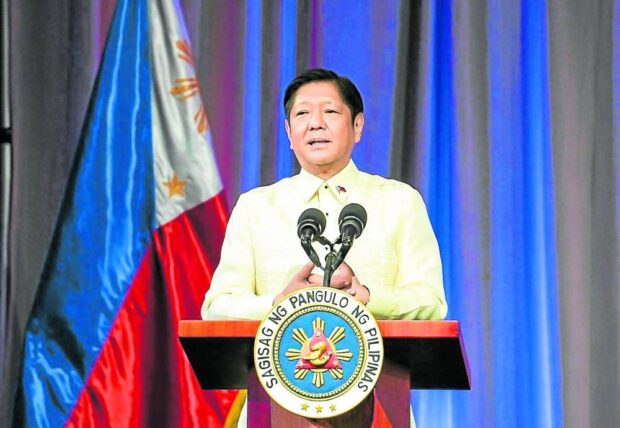
President Ferdinand Marcos Jr. (MALACAÑANG PHOTO)
PAGUDPUD, Ilocos Norte, Philippines — President Ferdinand Marcos Jr. on Friday warned that the pension fund for military and other uniformed personnel (MUP) will be depleted in five to six years unless the government finds ways to make the pension system “self-sustaining.”
“If we keep going the way we do, my prediction is that it will run out within five [to] six years. Before that happens, we [should be] already ahead of it,” the president told reporters after leading the inauguration of a wind farm here run by the Ayala conglomerate.
Marcos said the government is “in the midst of putting together the pension plans” to make sure that the fund becomes “self-sustaining.”
This was the first time the president spoke about the pension fund for members of the Armed Forces of the Philippines, Philippine National Police, Philippine Coast Guard, Bureau of Jail Management and Penology, and Bureau of Corrections, among other uniformed personnel — almost two months after Finance Secretary Benjamin Diokno warned about the ballooning pensions which he said could lead to “fiscal collapse.”
According to Malacañang, Marcos immediately ordered a review of the MUP pension system following Diokno’s concerns about the “unfunded liabilities” arising from it.
As Diokno explained at a press briefing on May 5, MUP pensions are funded largely by borrowings and interest — with no contributions from these personnel.
In 2021 alone, the government borrowed P127.3 billion, which went with an additional P6.2 billion in interest expense, to provide funding for these pensions.
“If the current [system] is allowed to continue in the years ahead, the whole system is fiscally unsustainable,” Diokno said.
“If we do not address the huge and rising unfunded liabilities of the current … system now, securing sufficient resources to provide for the benefits of future pensioners and their dependents will be extremely challenging,” he added.
Comparative figures
The finance chief said further that retired MUP receive a monthly average of P40,049, whereas members of the Social Security System (SSS) and the Government Service Insurance System (GSIS) — who remit to those funds — are paid an average of P4,528 and P13,600, respectively.
“Compared to other pension systems, this amount [for MUP] is 8.8 times higher than under the SSS and 2.9 times higher than under the GSIS,” Diokno said.
He noted that this year, payouts to MUP have so far reached about P213 billion.
National Treasurer Rosalia de Leon confirmed that estimate at a Senate hearing on May 15, adding that it is projected to more than double to P537 billion by 2030 and P1.5 trillion by 2040 if loans can still be obtained for those pensions.
This year the government is “paying approximately P11.5 billion … just for interest” from borrowings, she told the Senate Committee on National Defense and Security, Peace, Unification, and Reconciliation, headed by Sen. Jinggoy Estrada.
“[This] will further balloon to P40 billion in 2030 and P171 billion in 2040,” De Leon said.
Mandatory contributions
The International Monetary Fund has affirmed these concerns, saying last week that pension liabilities “would crowd out social and infrastructure spending” if left unresolved.
Diokno said: “We are determined to come up with a reasonable proposal in consultation with the concerned agencies and stakeholders.”
The Department of Finance (DOF) is scheduled to meet on Monday with De Leon and MUP representatives, among other officials, as they aim to fine-tune proposals to overhaul the system.
The DOF said it is pushing for a reformed system that “should apply to those in the active service and new entrants and members across all MUP agencies.”
De Leon said the government’s economic team supports mandatory contributions by MUP, as she pointed out that more money was being spent on pensions of retired police and military personnel than on maintaining an active force.
She cited figures in 2021 showing that the government spent P160 billion for MUP pensions — 38 percent higher than the P116 billion spent on maintenance and other operating expenses and capital expenditures.
“We are already spending significantly more on pension liabilities than on keeping our military and uniformed services safe, competent, and in fighting shape,” De Leon told the Senate.
But acting Defense Secretary Carlito Galvez Jr., who also attended the May 15 hearing, said: “The prevailing sentiment among our uniformed personnel is that they should be consulted first before the recommendations be infused in [a] proposed law.”
He said the government must clarify what the mandatory contributions entail, so this would be “acceptable to all.”

